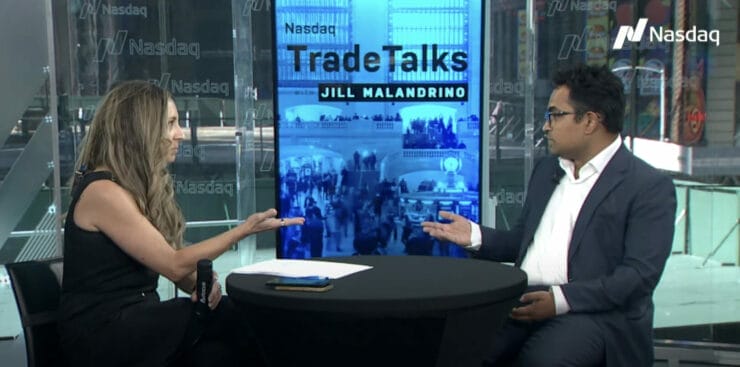During the 2022 Chainlink SmartCon event, September 28-29 in New York City, Nasdaq TradeTalks’ Jill Malandrino hosted a two-day interview lineup at the MarketSite Studio in Times Square with some of the conference’s 100+ expert speakers from the Chainlink ecosystem.
After speaking with Ava Labs Founder Emin Gün Sirer about innovating Avalanche’s high-speed blockchain ecosystem, Malandrino sat down with Sid Jha, the founder and CEO of Arbol, an end-to-end parametric insurance platform that allows any business to protect against climate risk.
Jha highlighted how big the global climate risk protection gap is and how blockchain-based parametric insurance offers a scalable solution.
In 2020, businesses around the world suffered more than $268 billion in damages from more than 400 major natural disasters. Only $97 billion (36%) of that damage was covered by insurance.
Arbol uses Chainlink oracles to retrieve real-world weather and climate data related to temperature, rainfall, windspeed, etc. Policies written as smart contracts automatically execute when certain data prerequisites are met.
“It’s not like an old-school insurance policy where an adjuster is coming to your farm or business to check the damage,” Jha explained.
For example, in the event of low rainfall, an insured farmer would automatically receive a predefined payout triggered by Chainlink’s decentralized weather data.
“This brings tremendous amounts of scale and efficiency to a currently very onerous process with a lot of people involved,” Jha said.
With costly climate-related disasters on the rise, Arbol’s growth is also accelerating. The platform’s transaction volume increased from $2 million in 2020, to $70 million in 2021, to over $100 million in just the first half of 2022.
In addition to commercial farmers and agribusinesses, renewables like wind and solar energy represent some of Arbol’s biggest markets.
Jha believes the world is on the cusp of taking serious measures to defend against the harmful effects of climate-driven catastrophes.
“The whole financial system is starting to wake up about climate risk,” he said, indicating the “tremendous amounts of climate risk” shouldered by global financial institutions.
“At some point, they will have to start insuring it, hedging it, because they will not be able to carry so much climate risk as natural disasters become more frequent.”
Watch Jill Malandrino’s full interview with Sid Jha on Nasdaq TradeTalks.


